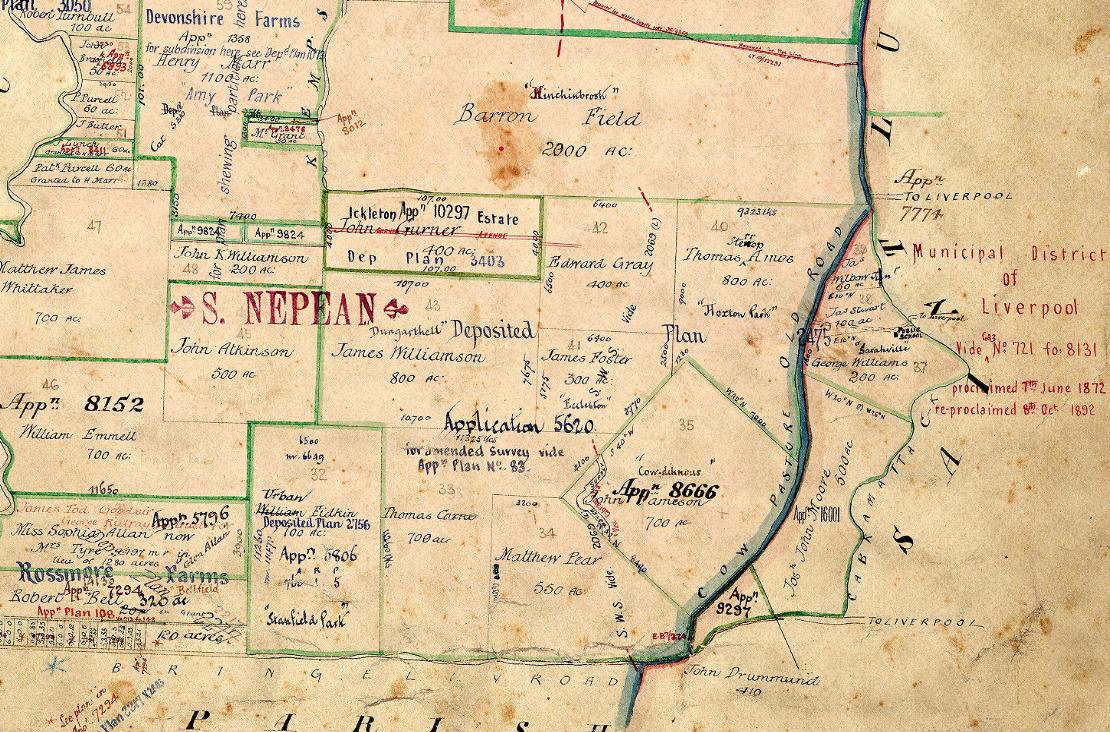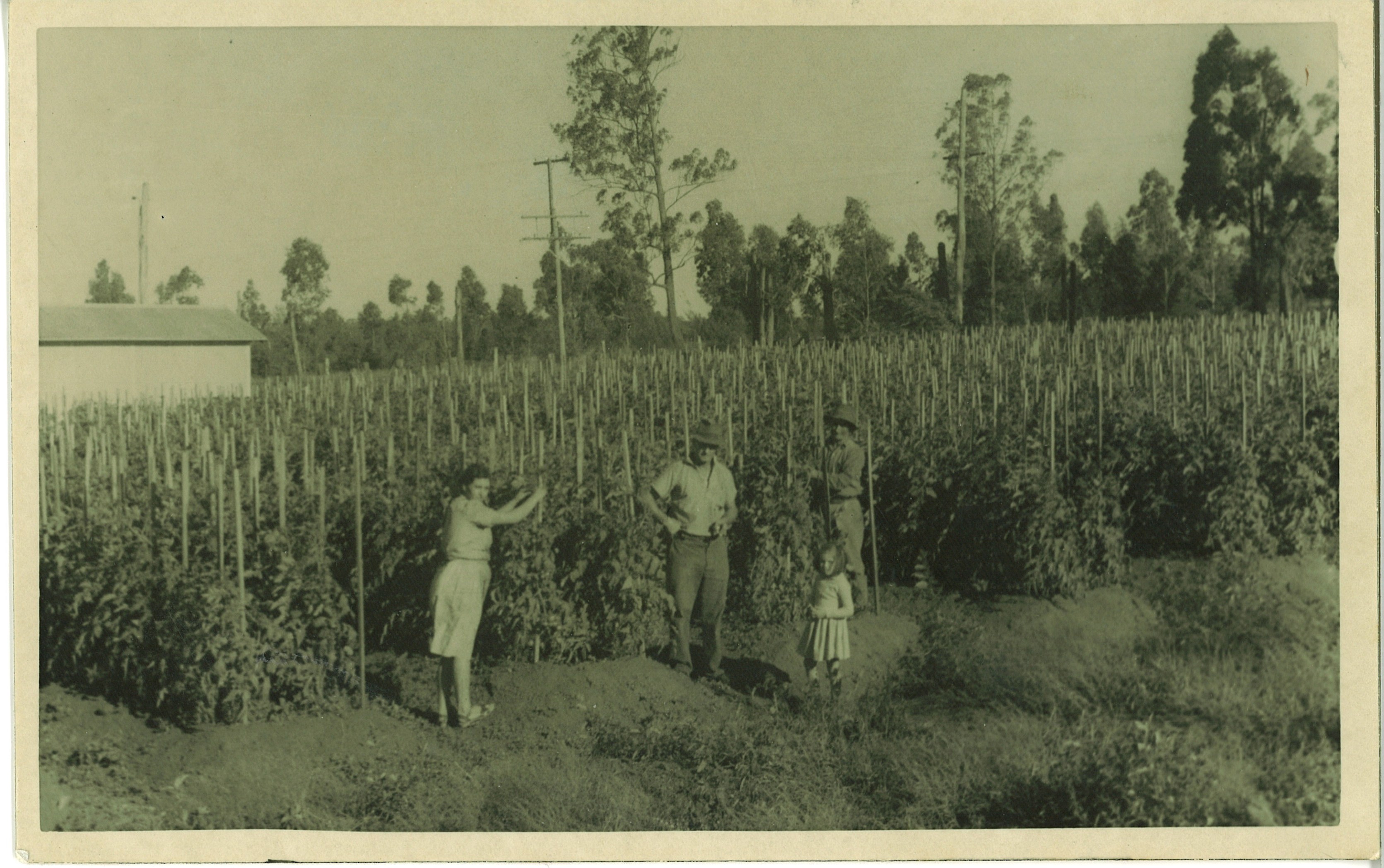Austral was officially gazetted on 7 April 1972 in the Parish of Cabramatta. The suburb of Austral is named for the Austral Banking and Land Proprietary Company. Originally Austral was in the area of West Hoxton.
Colonial Land Grants
The first land grants in Austral were given in 1818 and 1819 to colonial public servants. John Gurner, a solicitor, James Williamson, in charge of the government stores, and James Foster, a convict turned clerk, were amongst them. John Gurner had arrived in Australia in 1817. By 1826, Gurner had cultivated 40 acres and cleared and fenced about 80 acres, which he was using for horses and cattle. Gurner Avenue is named after him.

Section of map of Austral, circa 1800
Austral in the Twentieth Century
Gurner’s land was later passed to a syndicate named the Austral Banking and Land Proprietary.
Austral Post Office opened on 7 February 1894. In the late 1920s a soldier settlement scheme was established in Austral, but this was not successful. Several social services were introduced in the 1930s. The Austral Church of Christ began regular Sunday services in 1935. In 1938 the Austral branch of the Agricultural Bureau of NSW established a Bush Fire Brigade, and a telephone exchange and electricity were connected. In 1939 water was laid on in the area and the first bus service was started.
During World War II, temporary army camps were set up near what is now Scott Park and between 10th and 11th Avenues on the western side of Edmondson Avenue.
For many years Austral remained peri-urban, forged from an interaction of urban and rural land uses. Many residents lived on small acreages with a minimum of 2 hectares per block.

Tomato Farm, Austral, circa 1940
Austral Public School
In 1891, an application listing 44 children was made for another school for the children living on the western end of the Hoxton Park Estate. The Austral Banking and Land Proprietary gave three acres for the school and when the new school opened in 1893 it was named Austral Public School in honour of the company.
In the week ending 14 July 1893 there were 21 children enrolled at Austral Public School. Extensions were made to the school by 1938. During the war years a public call-out was released asking for assistance in digging slit trenches and air raid shelters for the children’s safety in case of attack. At this time the senior boys created Victory Gardens. Produce from these gardens was sold to the community and profits were given to the war fund. In June 1956 a new building containing four classrooms, an office, staffroom, storeroom and other facilities were opened. In late 1977 the school was expanded further.
People gradually began calling the area Austral after the school and the company, but the name was not made official until 1972.
Austral: Dictionary of Sydney https://dictionaryofsydney.org/place/austral#ref-uuid=09676fac-73ed-a6ca-c726-c43e43e86c58
Pictorial History: Liverpool & District by Carol Liston (2009), p.53
GEOGRAPHICAL NAMES ACT, 1966 (1972, April 7). Government Gazette of the State of New South Wales (Sydney, NSW : 1901 - 2001), p. 1199. Retrieved May 25, 2021, from http://nla.gov.au/nla.news-article220139777
Austral Public School (N.S.W.), Recollections : a history of Austral, Liverpool City Library Heritage Collection. Catalogue record: https://liverpool.spydus.com/cgi-bin/spydus.exe/ENQ/WPAC/BIBENQ?SETLVL=&BRN=125662
Suburbs and localities : Austral, Local Studies Pamphlet, Liverpool City Library Heritage Collection. Catalogue record:
https://liverpool.spydus.com/cgi-bin/spydus.exe/ENQ/WPAC/BIBENQ?SETLVL=&BRN=74442
Erica Prokoph Clarke and Mary Haak. Austral Public School Centenary 1893-1993. [Austral : Austral Public School Centenary Committee, 1993].
See something missing?
You know your suburb better than anyone. If you think an important part of your suburb’s history is missing, whether recent or distant, reach out to the Local Studies Team through our online Local and Family History enquiry form. We are always looking for new ways to bring the vibrant history of Liverpool to life!
